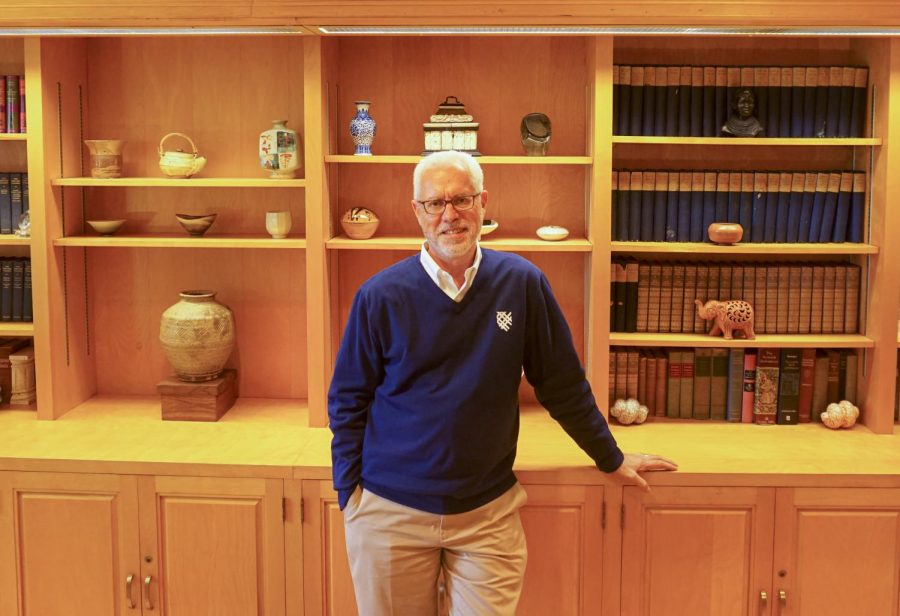Community challenges Rosenberg’s anti-free college stance
October 10, 2019
In the heat of the race to secure the 2020 Democratic nomination, proposals to make public colleges and universities tuition free have gained steam— but some professionals in higher education are pushing back against the idea.
On Sept. 13, President Brian Rosenberg published an article in The Chronicle of Higher Education titled “Free Public College is a Terrible Idea.”
“Let’s pretend, for the sake of argument, that the proposal is not both unaffordable and unenforceable without an unprecedented level of state cooperation and expenditure,” Rosenberg wrote. “Let’s pretend as well that it is more than bumper-sticker material and actually the product of careful thought. Let’s pretend that it actually could become the law of the land.”
Sen. Bernie Sanders (I-VT) brought the idea of free public college into the national spotlight in 2015, when he proposed a $70 billion plan to make all 4-year public colleges and universities free.
In 2017, Sanders and Rep. Pramila Jayapal (D-WA) officially introduced the formal College for All Act to eliminate tuition and fees at four-year public colleges and universities for families making up to $125,000 — about 80 percent of the population — and make community colleges tuition and fee-free for all.
Sanders’ idea, now backed by other presidential candidates including Sen. Elizabeth Warren (D-MA), have also gained steam at the state level.
Since 2015, Maryland, New York, Hawaii, Oregon, Montana, Minnesota and many other states have enacted legislation for a similar tuition-free program for two-year institutions. In 2018, New York enacted the Excelsior Scholarship program, the first state program to offer full tuition or “last dollar” assistance to students at the four-year level.
But Rosenberg wrote that making public college tuition free would mean paying for wealthy students to attend public colleges. This might, he suggested, exacerbate racial and class inequities in the makeup of colleges and universities — citing statistics demonstrating that many elite public state universities already enroll students from wealthier families.
“The median family income at [The University of] Virginia is $155,500, and 67 percent of students come from the upper economic quintile,” Rosenberg wrote. “At Michigan the numbers are $154,000 and 66 percent, and at the University of Minnesota — economically diverse by comparison — $110,000 and 50 percent.”
He also posited that the increase in applications that may result from eliminating tuition at the top public universities would only make them harder for less-privileged students to get into.
“Unless those elite universities completely changed their admissions practices, an increase in selectivity would benefit primarily the high-achieving students who attend private and well-funded suburban high schools,” Rosenberg wrote. “Nothing in the ‘free tuition’ plans addresses the capacity of these universities to enroll more students, so the applicants most likely to be squeezed out would be those from precisely the economic backgrounds that the plans are intended to help.”
Rosenberg said that he had the idea to write the article after attending a summer meeting at the National Press Club with other college presidents.
“One of the reporters asked the group ‘What do you think about the free college plans?’ And so I was one of the people who answered that,” Rosenberg said. “But it led me to think that what I said in that meeting might be a useful thing to say more broadly.”
The article, which was publicized to the community through the Mac Daily, drew a number of strong reactions from people across campus.
Educational studies professor Brian Lozenski read the article shortly after it came out. Lozenski, too, believes that too many of the Democratic presidential candidates have made it sound like providing free public higher education will necessarily end poverty in the United States, or substantially increase equity.
“Free public education will not solve racial and class inequity in this country,” Lozenski said. “And it could exacerbate [inequity] if we’re creating policies that…do not address issues of wealth accumulation and wealth hoarding. I think that’s what he effectively communicated through his article.”
But while Lozenski agreed with some of the specific points Rosenberg made, he disagreed with the premise of his article.
“Where I pull away from the article is in the notion that [free public education is] a terrible idea,” Lozenski continued. “I think that’s a bit hyperbolic. I don’t think it’s a terrible idea. I think we need to talk about what happens when we don’t frame education as a commodity, and how free public education helps us to be smart and sophisticated about not framing education that way.”
Several Macalester students felt similarly. SPACES co-editor Jennings Mergenthal ’21 criticized the piece on the SPACES Instagram story on Sept. 24. SPACES is a student-of-color led publication focused on dismantling common narratives of academia.
“Categorically asserting that free public college is a bad idea because it would also help middle class and potentially upper-class people is a weird and not especially effective refutation considering how many poor underprivileged kids it would help,” Mergenthal said.
Mergenthal believes that Rosenberg should adopt a more open-minded perspective on how the next administration can make free public college more effective for marginalized students.
“Medicare for all is also a slogan-y bumper sticker idea,” Mergenthal said. “The affordable care act was a slogan-y bumper sticker idea. While yes, on some level you have to promise people things that they want in order to get yourself elected, that seems like a not-good faith, rather disingenuous point to make.
“Saying, ‘this social policy isn’t effective because it would only help this limited number of marginalized people,’ is the wrong framing,” they said. “It’s ‘this policy is limited because it could only help this number of people. How could we make it help more?’”
Mergenthal also felt that Rosenberg failed to acknowledge his positionality as the president of a private college.
“His position is very much informed by his running a private university that would potentially see a deficit of underprivileged and marginalized kids that Macalester loves to tokenize because they would not be attending this institution where you have to pay $[68 thousand] a year,” Mergenthal said.
“Since Rosenberg is running a school like this, it’s really easy to say that free public education would not be a good idea,” Income Inequity Commission (IIC) chair Mandy Ortiz ’21 said. “But I don’t think that he’s acknowledging the privilege that he has in being able to say that because he’s benefited from this higher education system that has kept so many people out.”
Like Lozenski, Ortiz agrees that free higher education is often framed by politicians as the essential pathway to ending poverty in the United States.
“There are systemic rooted problems from oppression that keep people out of the education system,” Ortiz said. “Providing free higher education I think will help with some of these problems, but it’s more so putting a bandage instead of trying to really address the problems of the education system before college.”
Admissions multicultural program coordinator Ashley Vargas ’21 also read the piece. Vargas coordinates the annual fall and spring extended samplers for prospective students who identify as people of color. She says she facilitates quite a few conversations about the cost of Macalester during both extended samplers.
“I think it would be incredible to level out the playing field because money is a huge thing that stops people from going to college,” Vargas said. “It [could] increase college access a lot.
“[Prospective students] are always talking [about] financial aid,” she continued, “and it’s just very upsetting having to see all of these students so stressed about how much Macalester costs and the gap that there still is between the financial aid and cost of attendance.”
Dalton Greene ’22 is the President of the Macalester chapter of QuestBridge, a national program that connects low-income students to scholarship and financial aid opportunities. He found that the article failed to account for the perspectives of low-income students who would most benefit from tuition-free college options.
“Mac obviously has great financial aid, but without that, free public college would make a huge difference in so many students’ lives,” Greene said. “So to take an issue that is so central to people’s identities, and be like ‘that’s a terrible idea’ — I think was a big misstep on his part.”
Greene chose to attend Macalester for its activist spirit and commitment to fostering a learning space for people of all backgrounds. He said that commentary like Rosenberg’s undermines those values.
“Macalester… is a good place for pushing the socioeconomic conversation, and there’s definitely been a lot that’s been going on, but it feels kind of half-hearted,” Greene said. “[I liked] Mac for its spirit of change and progress and all of that, and it’s kind of disillusioning that [Rosenberg] is like this.”
Greene pointed out that many colleges are now doing their best to dismantle barriers to entry, including application fees, standardized test requirements and textbook rentals.
“Historically, colleges have sort of been gatekeeping the social mobility that they can give someone just through all of those barriers that are only just now being recognized and worked against,” Greene said.
Assistant Dean of College Access, Retention and Success Sedric McClure argued that any attempt at making higher education more attainable is better than none.
“Perhaps stratification and inequality will always be with us,” McClure said. “But I would love to try to have free education for everybody. And we get to fight about the means and the ways in which we can do that. To continue and fight for, implement and guard equity in that whole process.”












